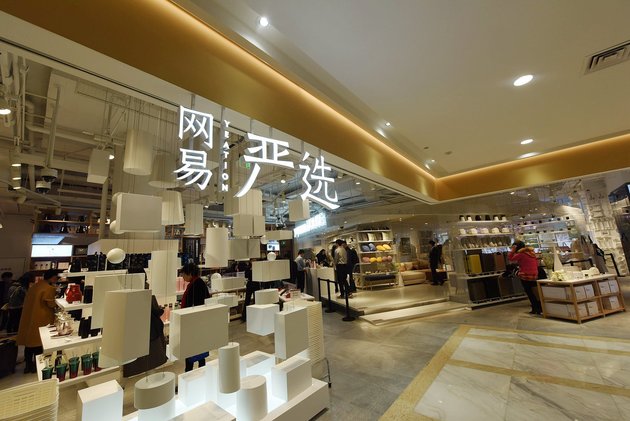
Photo/VCG
Dec. 20 (NBD) – NetEase's e-commerce brand Yanxuan launched its first physical store in a landmark shopping mall in Hangzhou to explore new business model that integrates online and offline retailing.
The 300-square-meter store stocks over 1,000 items selected from the online platform including kitchenware, furniture and other products. When consumers buy products from the store, the order will be recorded in their online Yanxuan account as well, enabling them to seek after-sale services via their phones.
The store is designed by a famed Japanese designer, and its palette of white and natural wood colors is reminiscent of Japanese lifestyle brand Muji.
It is noted that half of the store space is used for displaying products in various household scenarios so that consumers can have better experience.
Ding Lei, founder and CEO of NetEase, revealed the plans to open brick-and-mortar stores for its e-commerce brands at the beginning of this year, but emphasized the stores are more for displaying and user experience.
Ye Shushu, head of NetEase Yanxuan's off-line business, confirmed the idea. The Hangzhou store hopes to present an ideal household for the young generation, and encourages consumers to take photos and have a first-hand experience of the products, said Ye.
In the future, NetEase Yanxuan intends to combine data collected from offline stores and online consumption trends to achieve smart product selection, added Ye.
Ye further revealed that NetEase Yanxuan plans to open more stores in first and second tier cities in 2019, including flagship stores larger than the Hangzhou-based one, as well as smaller stores in communities.
The fusion of online and offline retailing has become a new trend for e-commerce. Taobao Xinxuan of Alibaba and Xiaomi Youpin of the smartphone manufacturer Xiaomi opened their physical stores earlier this year.
NetEase, one of the first Internet companies in China, entered the e-commerce sector in 2015, and now runs two brands: cross-border shopping platform Kaola, and Yanxuan.
The latter, meaning "strict selection" in Chinese, claims that the products offered on the platform are manufactured by suppliers to internationally renowned brands such as Calvin Klein, Hugo Boss and Muji, but the prices are much lower. The practice is called by some as "copycat".
According to the third quarter financial report of NetEase, e-commerce sector brought in 4.459 billion yuan (646.8 million U.S. dollars) in revenue, marking a 67.2 percent growth year on year and accounting for 26 percent of total revenue.
Email: limenglin@nbd.com.cn


 川公网安备 51019002001991号
川公网安备 51019002001991号





